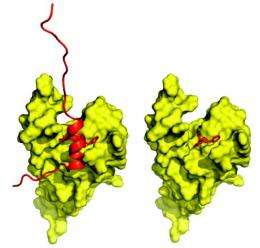Scientists found a group of molecules that could provide clues to the development of various diseases. Credit: The American Chemical Society
Scientists in Michigan and California are reporting an advance toward development of a new generation of drugs that treat disease by orchestrating how genes in the body produce proteins involved in arthritis, cancer and a range of other disorders. Acting like an “on-off switch,” the medications might ratchet up the production of proteins in genes working at abnormally low levels or shut off genes producing an abnormal protein linked to disease.
Their report is in the current issue of ACS Chemical Biology.
In the study, Anna K. Mapp and colleagues discusses molecules that cause genes to be active and churn out proteins — so-called transcriptional activators. That’s because because they control a key process known as transcription, in which instructions coded in genes produce proteins. Malfunctions in these activators could lead to altered transcription patterns that lead to disease. For example, variations in the tumor suppressor gene p53 are found in more than half of all human cancers.
Mapp describes discovery of a group of molecules that could be used to help scientists better understand transcription. Known as activator artificial transcriptional activation domains, these small molecules mimic natural activators and could provide insights on how mistakes in gene regulation result in various diseases.
“Evidence suggests that these small molecules mimic the function and mechanism of their natural counterparts and present a framework for the broader development of small molecule transcriptional switches,” Mapp states.
More information:
Source: ACS


















